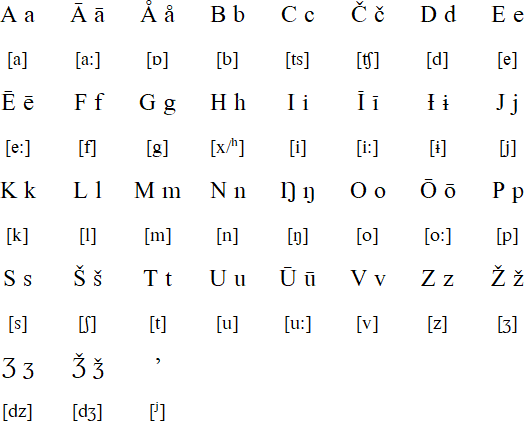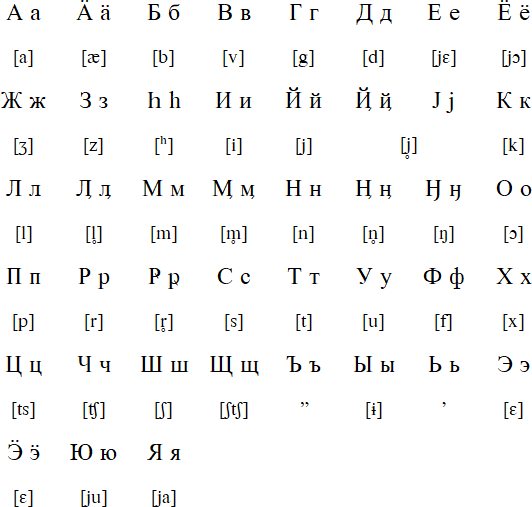Ter Sámi is an Eastern Sámi language spoken in the northeast of the Kola Peninsula in Russia. In 2010 only two people spoke this language.
At the end of the 19th century about 450 people spoke Ter Sámi in six villages in the east of the Kola Peninsula. During the 1930s as a result of Soviet collectivisaiton, the Ter Sámi people were forbidden to speak their language at home and in schools, and the inhabitants of the largest Ter Sámi village, Jokanga, were forced to move to the Gremikha military base in 1964. By 2004 the number of Ter Sámi people had dwindled to 100, and only two of them spoke Ter Sámi - the remainder had shifted to Russian.
The is no standard spelling system for Ter Sámi, and the language is only partly documented. There are some collections of text specimens, audio recordings and dictionaries made by linguists, but there is no grammatical description.
The British explorer Stephen Burrough compiled a short vocabulary of Ter Sámi in 1557, which was published by Richard Hakluyt. This was the first known documention of a Sámi language.
A spelling system for Ter Sámi using the Latin alphabet and based on Skolt Sámi was developed in the 1930s. After the Second World War this was replaced by a system using the Cyrillic alphabet and based on Kildin Sámi.


Some of the information on this page was supplied by 이윤호
Download alphabet charts for Sámi languages (Excel)
Information about Ter Sámi | Numbers
Information about Ter Sámi
http://en.wikipedia.org/wiki/Ter_Sami_language
Akkala Sámi, Inari Saami, Kildin Sámi, Lule Sámi, Northern Sámi, Pite Sámi, Skolt Sámi, Southern Sámi, Ter Sámi, Ume Sámi
Abaza, Abkhaz, Adyghe, Aghul, Akhvakh, Akkala Sámi, Aleut, Altay, Alyutor, Andi, Archi, Assyrian / Neo-Assyrian, Avar, Azeri, Bagvalal, Balkar, Bashkir, Belarusian, Bezhta, Bosnian, Botlikh, Budukh, Bulgarian, Buryat, Chamalal, Chechen, Chelkan, Chukchi, Chulym, Chuvash, Crimean Tatar, Dargwa, Daur, Dolgan, Dungan, Enets, Erzya, Even, Evenki, Gagauz, Godoberi, Hinukh, Hunzib, Ingush, Interslavic, Itelmen, Juhuri, Kabardian, Kaitag, Kalderash Romani, Kalmyk, Karaim, Karakalpak, Karata, Karelian, Kazakh, Ket, Khakas, Khanty, Khinalug, Khorasani Turkic, Khwarshi, Kildin Sámi, Kili, Komi, Koryak, Krymchak, Kryts, Kubachi, Kumandy, Kumyk, Kurdish, Kyrgyz, Lak, Lezgi, Lingua Franca Nova, Lithuanian, Ludic, Macedonian, Mansi, Mari, Moksha, Moldovan, Mongolian, Montenegrin, Nanai, Negidal, Nenets, Nganasan, Nivkh, Nogai, Old Church Slavonic, Oroch, Orok, Ossetian, Pontic Greek, Romanian, Rushani, Russian, Rusyn, Rutul, Selkup, Serbian, Shor, Shughni, Siberian Tatar, Sirenik, Slovio, Soyot, Tabassaran, Tajik, Talysh, Tat, Tatar, Teleut, Ter Sámi, Tindi, Tofa, Tsakhur, Tsez, Turkmen, Tuvan, Ubykh, Udege, Udi, Udmurt, Ukrainian, Ulch, Urum, Uyghur, Uzbek, Veps, Votic, Wakhi, West Polesian, Xibe, Yaghnobi, Yakut, Yazghulami, Yukaghir (Northern / Tundra), Yukaghir (Southern / Kolyma), Yupik (Central Siberian)
Languages written with the Latin alphabet
Page last modified: 23.04.21
[top]
You can support this site by Buying Me A Coffee, and if you like what you see on this page, you can use the buttons below to share it with people you know.

If you like this site and find it useful, you can support it by making a donation via PayPal or Patreon, or by contributing in other ways. Omniglot is how I make my living.
Note: all links on this site to Amazon.com, Amazon.co.uk
and Amazon.fr
are affiliate links. This means I earn a commission if you click on any of them and buy something. So by clicking on these links you can help to support this site.
[top]